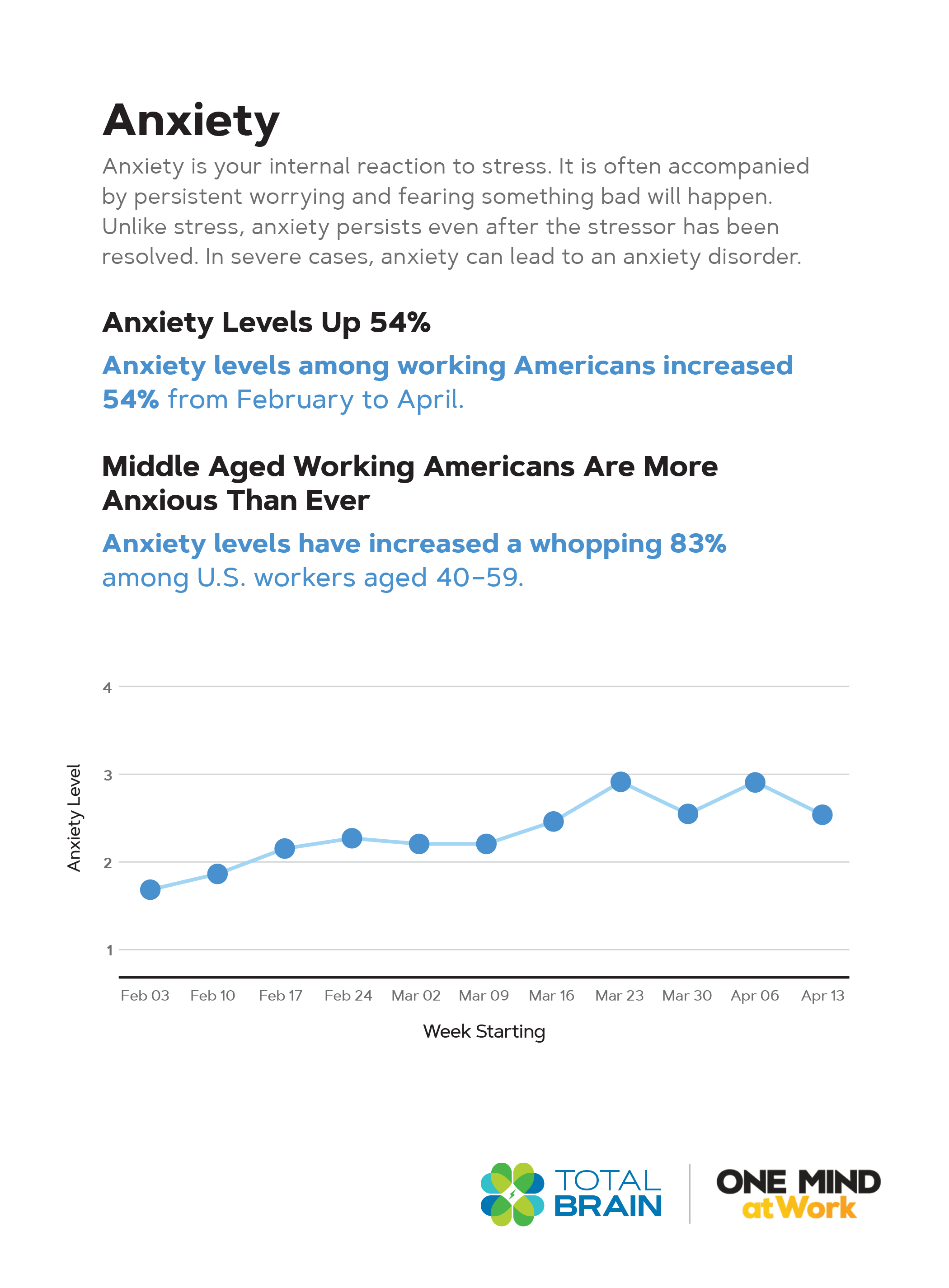By Matt Resteghini on Wed, Jun 10, 2020
Results of the First Mental Health Index: U.S. Workers Edition
We are excited to announce the results from our first Mental Health Index: U.S. Workers Edition. As you know, mental health data exists, and is widely reported on by various governmental bodies and health agencies. While this survey data provides important information for broader public health initiatives, the Mental Health Index is different in four key ways:
- The Mental Health Index: U.S. Workers Edition focuses specifically on the mental health status of working Americans, bringing into focus a population that is not highly visible in broader survey data.
- The methodology behind the Mental Health Index differs substantially from a survey; in fact, the data contained in the Mental Health Index is not survey data by nature. Rather, it is derived from a mix of validated tasks and questions that are part of a unique neuroscientific assessment protocol.
- Finally, because the Mental Health Index uses validated tests and questions, rather than relying on subjective responses from survey respondents, it is able to better quantify the true mental health and well-being of the workforce population, eliminating problematic underreporting that can sometimes be seen in survey data.
- Using a sampling of data from Total Brain’s neuroscientific assessment tool, the Mental Health Index provides a valid national benchmark to measure mental health progress and performance in the workplace.
This first set of results was especially interesting because it reported on mental health and wellness trends from the pre-COVID 19 pandemic period, through to mid-April when the pandemic’s effects had reached every corner of America.
The impacts of the COVID pandemic on American workers’ mental health are complicated and far-reaching, and the solutions will be equally complex and comprehensive. But fortunately, there are measures that can be taken immediately to help relieve some of the pressure currently permeating workplaces across the country.
Mental Health Index Results: Portrait of an American Worker in Crisis
The results of the first Mental Health Index: U.S. Workers Edition are concerning, although not surprising given the circumstances. You can review all the findings here, but in summary, the Index revealed that American workers are experiencing:
- A 38% increase in stress;
- A 54% increase in anxiety; and
- A 2x risk of depressive disorders.
The results are even more alarming within the demographic of workers aged 40-59, a group that often occupies leadership roles in many organizations. This group is experiencing a 52% increase in stress, an 83% increase in anxiety, and a 2.9x risk of depressive disorders.
And while emotional awareness remains unchanged, non-conscious negativity bias (a measure of emotional flexibility and creativity) rose by 7% - meaning in aggregate, the American workforce is more on edge, but no better at reading the emotional cues being reflected back by their coworkers.
Instantly Improve Mental Health by Simply Breathing
Clearly, the Mental Health Index reveals some troubling findings and raises real concern for the overall mental well-being of our nation’s workforce. How can employers get in front of this right now?
Our number one tip for working Americans who need to immediately combat the added stress and anxiety during today’s chaotic times, is to simply breathe.
Research-backed exercises like those found in the Total Brain app can help to build mental capacity in areas such as emotion, feeling, cognition and self control. Over time, these exercises can mitigate many of the mental health impacts that COVID-19 and other recent stressors have had on the American workforce.
Overstressed, highly anxious and depressed workers need a tool that they can use to handle negative emotions and overwhelm in the moment. Total Brain’s meditation and breathing exercises are just the tool to help in these instances.
Here’s a checklist that helps businesses identify stress and anxiety triggers employees may be dealing with as a result of COVID-19 that can be managed with controlled breathing exercises: Managing Through Pandemic: How to Improve Employees’ Mental Focus and Workplace Performance.
The Benefits of Meditation and Breathing Exercises
A meta-analysis published in the journal Frontiers in Human Neuroscience found that slow breathing techniques - central to Total Brain’s meditation and breathing exercises - affect the autonomic and central nervous systems and support other physiological changes.
Ultimately, these changes result in “increased comfort, relaxation, pleasantness, vigor and alertness, and reduced symptoms of arousal, anxiety, depression, anger, and confusion.”
Quite simply - there’s a wealth of peer-reviewed scientific data that supports the use of breathing and meditation techniques to improve mental well-being.
How Total Brain Uses These Activities
Given the scientifically-validated impact of breathing and meditation techniques on overall mental health and well-being, the customized feed for each and every Total Brain user includes one such exercise on a daily basis.
While it can take some time for users to get the hang of meditation and breathing exercises, the payoff is well worth it. An article published in Forbes outlines many of the psychological and physiological benefits that those who regularly practice meditation can expect to gain, including better-preserved grey matter, volume changes in key areas of the brain, improved concentration and attention, and more.
Case Study: Mollie Lombardi’s Experience
When we released the Mental Health Index: U.S. Workers Edition, Mollie Lombardi, an analyst at Human Capital Strategies, helped us share the findings during a webinar with World Congress. Watch the full overview here:
We first met Mollie last year, when we shared some breath coaching with her as part of a conversation about Total Brain. A few months later, Mollie put that coaching into practice with impressive results.
“Seven months ago, I had a brain surgery for my Parkinson's disease,” explained Mollie. “If you've ever had brain surgery or seen it on TV, they want you to be awake during it. So to manage my anxiety... I learned how to breathe.”
The impact of learned breathing techniques isn’t just subjective. Mollie recounts that during the surgery, “My doctor is taking my blood pressure while I'm breathing and saw it go down. I've been able to control my anxiety through that very traumatic several hours of having a holster on my skull.” As Mollie’s experience suggests, breathing and meditation exercises can be immediately useful in high-stress, high-anxiety situations to control the nervous system response, in addition to the myriad long-term, cumulative benefits promised.
Putting it Into Practice: The Power of Peacefulness
To understand how your organization is faring compared to the overall American workforce, you can implement a free, three month Total Brain subscription trial. This gives your team immediate access to the complete suite of brain-capacity-building tools found within the Total Brain platform, including the powerful breathing and meditation exercises I’ve talked about in this blog.
Your organization will also receive aggregate reports that give you greater insight into the mental health and well-being of your teams as a whole, and will allow you to compare your performance against the national benchmarks established in the Mental Health Index: U.S. Workers Edition.
Over the course of the three-month trial, you can see how your teams’ performance changes to understand how the Total Brain Mental Health and Wellness Platform can generate improved well-being and productivity for your organization.
Breathe More, Stress Less
In today’s environment, it’s reassuring to know that simple, cost-effective solutions, like a conscious breathing practice, can help us better cope with the stress and uncertainty that abounds.
The research bears out the efficacy of this strategy, but you don’t have to rely on just the research - try it for yourself. Commit to practicing mindful breathing every day, and see how it impacts your own life. Then, share the word with friends and family and help transform the mental health and well-being impacts of the COVID-19 pandemic.
For more information about how COVID-19 is impacting the mental health of working Americans, read Mental Health Update: Fear and Uncertainty in the Age of COVID-19. This report shares a look at the data behind current mental health trends, the possible contributing factors, and the potential outcomes that could result if those factors are left unaddressed.
To keep a pulse on the mental health of working Americans, the Mental Health Index: U.S. Workers Edition will be released monthly in partnership with One Mind at Work and the National Alliance of Healthcare Purchaser Coalitions. The aim is to provide the public and corporations with a valid national benchmark that they can use to measure mental health progress and performance in the workplace.
To be the first to know, sign up to receive the latest editions of the Mental Health Index directly in your inbox when they are released.




comments